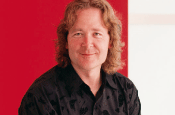When you've been fired for telling your boss he's an a****hole, been made redundant several times over and walked out of your job, you are unlikely to be branded a bleeding-heart liberal.
Yet Chris Arnold, who has done all of the above, will next month formally launch an "ethical" marketing agency and appears a tad concerned he'll be labelled a tree-hugger.
"I don't wear sandals and cycle to work," claims the 48-year-old creative partner. For a start, "there's a big hill on the way".
His job, as he sees it, is to help brands communicate with ethically oriented consumers, rather than be "a hippy who wants to do advertising".
Tapping into a growing demand from blue-chip clients to showcase ethical credentials in their marketing, his new, full-service outfit is aiming to sweep up business from those who can't find the ethical specialism within big agency networks, nor sufficient resource or experience within niche ethical shops.
It will operate under the name of Arnold's former agency, Feel, which he merged in 2005 with Ron Leagas' Edge Ideas to form BLAC. Feel will be run by Arnold and Johnny Barradale, both BLAC managing partners, plus a well-known industry figure as chief executive, yet to be announced.
As such, it will open its doors with eight clients inherited from the mother agency - with which it will continue to share resources - and its first win, the National Deaf Children's Society. Accounts include Eat Natural, Ricoh, the RSPB, Age Concern, Contiki youth holidays and Trafalgar Holidays.
"We realised that 40 per cent of BLAC's business was already in ethics," Arnold says of the rationale for the new agency. Feel was born of a realisation that "the ethical pound is where there's big business", along with staff passion for working on such accounts.
Arnold admits: "There's no greater feeling than waking up and thinking you might make a difference, and no worse one than thinking you will not and are selling cigarettes to kids."
He kept the name Feel, partly to be able to say he is recycling, partly because of residual recognition in the market.
For brands, this is an optimal time to plug into the ethical zeitgeist, he believes. "A free offer in-store might not be the (purchase) decider; it might be because something is more ethical. Consumers are no longer just making a purchase but a point. They use their purchasing power to make a difference."
But it's not always that people want to buy an ethical proposition as a lifestyle choice, he notes. "The big money is in off-setting", where people buy ethical products because that gives them permission to buy other less ethical ones."
This is where the importance of marketing comes in. "It's all about social badging," says Arnold. "You need to be able to show it off. People have the fair trade tea out by the kettle while the Typhoo is in the cupboard." Research BLAC conducted for an energy company found the biggest spenders on organic food were those who drove to the supermarket in the largest cars.
Consumer responsiveness to ethical issues is particularly sensitive in certain sectors, such as food and automotive, but across the board, brands need to choose carefully which of the 50 Key Ethical Values Feel has identified to highlight. These include recycleability, carbon footprint, food miles and fair trading. "For example, when a supermarket discounts fair trade bananas by 20 per cent, consumers want to know who's paying for it," Arnold says. And those who attempt an "ethical-wash", he warns, end up "looking like a twat".
CV
2007: Creative partner, Feel
2005-2007: Managing partner, BLAC
2002-2005: Founder & creative partner, Feel
2000-2002: Integrated creative director, Saatchi & Saatchi
1997-2000: Creative director, Stretch the Horizon
1994-1997: Creative director, Draft
1992-1993: Head of art/joint creative director, HK McCann
1988-1992: Art director then creative director, Alliance
1983-1988: Art director, Chetwynd Haddons, before going freelance
1982-1983: Junior art director, McCann-Erickson


